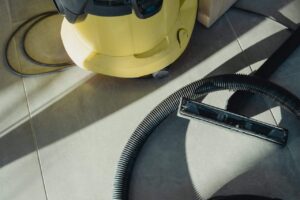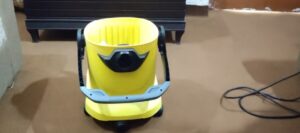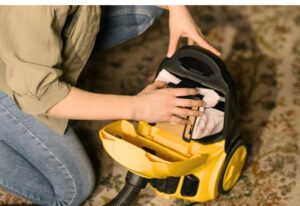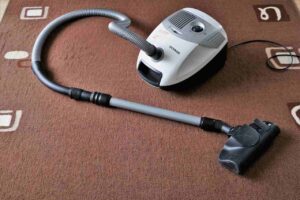Shark vacuums have earned a strong reputation for their cleaning performance, innovative features, and user-friendly design. As one of the fastest-growing brands in the home appliance industry, Shark combines modern engineering with affordability. But many people often wonder — Where are Shark vacuums made?
In this article, we’ll take a closer look at Shark’s manufacturing journey, production process, and how it compares with leading competitors like Dyson and Bissell.
Table of Contents
Where Are Shark Vacuums Made Today?
Today, Shark vacuums are designed and engineered in the United States, but most of the manufacturing and assembly take place in China. This approach allows Shark to maintain high product quality while keeping production efficient and cost-effective.
The parent company, SharkNinja, is headquartered in Needham, Massachusetts, USA, and operates research and development (R&D) centers around the world — including in the United Kingdom, Japan, Germany, Italy, China, and Spain.
By combining American innovation with global engineering expertise, Shark ensures that its vacuums deliver powerful suction, advanced filtration, and durable build quality. The brand’s international collaboration model has helped it expand quickly across markets in North America, Europe, and Asia.
Shark’s Manufacturing Journey
Shark’s story began in 1994, when Mark Rosenzweig founded Euro-Pro Operating LLC. The company initially sold sewing machines and steam cleaners, but soon gained attention for its powerful and lightweight vacuum cleaners.
In 2015, Euro-Pro was rebranded to SharkNinja to better reflect its two core brands — Shark for home cleaning and Ninja for kitchen appliances. Since then, Shark has grown from a small family business into a global consumer brand competing directly with giants like Dyson.
While early Shark products were assembled through small-scale partnerships, the brand soon shifted production to Asia, primarily China, where large-scale manufacturing facilities could handle growing global demand. This transition allowed Shark to scale efficiently while still maintaining strict control over quality and innovation.
Today, every Shark vacuum — from its cordless stick series to its robotic models — is built under close supervision and tested to meet international safety and performance standards.
Why Shark Moved Production from the USA
The decision to move production outside the United States was primarily driven by cost efficiency and scalability. Manufacturing vacuums in the U.S. was becoming expensive due to high labor and material costs. By shifting production to China, Shark reduced costs by nearly 25–30%, which allowed the company to reinvest more in research, innovation, and design.
Another major reason was supply chain accessibility. Many of the components used in modern vacuums — such as brushroll motors, sensors, and lithium batteries — are sourced from Asia. Building manufacturing hubs closer to these suppliers improved efficiency and reduced shipping delays.
Despite the move, Shark has kept its core design and R&D operations in the USA. This ensures that American innovation continues to drive every new product, while overseas factories handle efficient, large-scale production.
In short, Shark’s move wasn’t just about cutting costs — it was a strategic business decision that helped the brand compete globally without sacrificing performance or reliability.
Who Actually Manufactures Shark Vacuums?
While Shark designs all of its products in-house, the actual manufacturing and assembly are handled by partner factories in China. These facilities specialize in small home appliances and are equipped with advanced automation systems to maintain consistent quality.
SharkNinja has developed long-term relationships with these manufacturing partners. Its U.S. and UK engineering teams regularly visit the factories to oversee quality control, material selection, and final product testing. Every Shark vacuum must pass strict safety and performance checks before being shipped to retailers.
This hybrid model — American design + Chinese manufacturing + global quality control — allows Shark to produce reliable and high-performance vacuums at a competitive price point.
As a result, Shark has successfully balanced innovation and affordability, making its vacuums a favorite among homeowners worldwide.
Who Are Shark’s Competitors?
Shark faces strong competition in the vacuum cleaner market, with several established brands challenging its position. Its biggest rival is Dyson, a UK-based company renowned for powerful suction, advanced cyclone technology, and premium build quality. While Dyson often targets the high-end market, Shark offers similar performance at a more affordable price, making it a popular choice for budget-conscious consumers.
Other notable competitors include Hoover and Bissell, which are well-known in North America for durable, reliable, and versatile vacuums. Hoover specializes in bagged and bagless models, while Bissell is particularly popular among pet owners for its specialized pet hair tools. Miele, a German brand, also competes in the premium segment, emphasizing long-lasting performance, advanced filtration, and quiet operation.
In the cordless vacuum segment, Samsung and LG have emerged as competitors, offering sleek designs, strong battery life, and smart features. These brands are increasingly challenging Shark’s presence, especially in modern, tech-focused households.
Despite the competition, Shark maintains a strong market position due to its balance of innovation, affordability, and versatile features. Its Lift-Away technology, DuoClean brushes, and anti-allergen seals give it a unique advantage, helping it stand out even among well-established brands.
Summary
In summary, Shark vacuums are designed and engineered in the United States but manufactured in China under strict quality control.
By combining American innovation with efficient overseas production, Shark delivers advanced, reliable, and affordable vacuums. Environmental efforts, consumer-focused features, and strong warranties further enhance their value.
Whether you’re purchasing your first Shark vacuum or upgrading to a newer model, understanding where they are made provides a deeper appreciation of the brand’s global craftsmanship, technology, and commitment to quality.
Frequently Asked Questions
Do Shark vacuums come with a warranty?
Yes, most Shark vacuums come with a five-year warranty, and batteries typically have a two-year warranty. This coverage reflects the brand’s confidence in durability and ensures customers can use their vacuums with peace of mind
Are Shark vacuums made in the USA?
No, Shark vacuums are designed and engineered in the United States, but the actual manufacturing and assembly take place primarily in China. This approach combines American innovation with efficient overseas production.
Why doesn’t Shark manufacture vacuums in the USA?
Shark moved production to China mainly for cost efficiency and scalability. Labor and material costs in the U.S. are higher, and manufacturing closer to suppliers in Asia allows faster production while keeping prices affordable.
Is Shark a reliable vacuum brand?
Yes, Shark is considered highly reliable. Their vacuums undergo strict quality control, feature innovative technologies like Lift-Away and DuoClean®, and come with strong warranties, making them a popular choice worldwide.
How does Shark compare to Dyson and Bissell?
Shark offers high performance at a more affordable price compared to Dyson, while Bissell also provides budget-friendly options. Shark’s unique features, American-engineered design, and global manufacturing give it an edge in convenience, innovation, and value.

Welcome to Homenias, I’m Jaman M, and I’m here to help you discover the best home products. With years of experience, they offer genuine reviews and helpful guides. Their mission is to make your choices easier. It’s organizing your space or finding creative solutions. Explore how the right products can enhance your everyday life. Don’t miss out on finding the best home products to raise your living experience.





